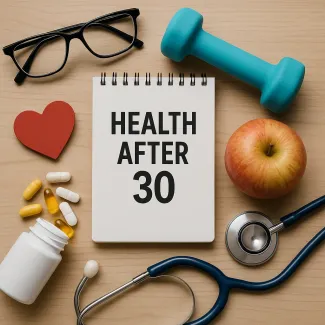
Health After 30: Early Signals You Shouldn’t Ignore
How lifestyle, nutrition, and habits impact your long-term well-being
The invisible shift: What really happens after you turn 30
As we transition into our thirties, subtle yet meaningful changes begin to manifest within the body. While most are gradual, their impact on long-term health can be significant if left unaddressed. The body's metabolism slows, recovery time increases, and hormonal balance begins to shift. These changes may seem minor, but they lay the groundwork for chronic conditions in the decades ahead. The good news? Early awareness and action can significantly alter your trajectory.
Understanding the body’s evolving needs and recognizing the first warning signs of common health issues is essential to preserving quality of life well beyond the 30s. Let’s explore the most frequent challenges and what you can do—today—to prevent them from growing into serious concerns.
Hormonal changes and their cascading effects
Hormonal fluctuations begin subtly after 30, especially in women approaching perimenopause and in men facing testosterone decline. These shifts can cause mood swings, fatigue, low libido, and weight gain, especially around the abdomen.
Supporting hormonal health naturally
• Prioritize healthy fats like avocado and olive oil to aid hormone production
• Reduce refined sugars and alcohol, which can disrupt endocrine function
• Consider adaptogenic herbs such as ashwagandha and maca to support adrenal health
• Get regular bloodwork to track estrogen, progesterone, testosterone, and thyroid hormones
Metabolism slowdown and weight gain
By the early thirties, our basal metabolic rate (BMR)—the number of calories burned at rest—starts to decline. This means your body burns fewer calories doing the same activities, making weight management more challenging.
How to maintain a healthy weight after 30
• Build and maintain lean muscle mass through resistance training 2–3 times per week
• Eat a protein-rich diet (1.2–1.6 g of protein per kg of body weight) to support muscle repair and satiety
• Avoid extreme dieting, which can slow metabolism further
• Stay hydrated to support cellular energy and fat metabolism
Digestive issues and gut health imbalances
As we age, digestive enzymes may decrease, leading to symptoms like bloating, gas, constipation, or acid reflux. These issues can be early signs of gut dysbiosis—an imbalance in the gut microbiome—that affects not just digestion but also immune function, skin clarity, and mental health.
Daily habits for better digestion
• Chew food thoroughly to stimulate enzyme production
• Include probiotic-rich foods (e.g., yogurt, sauerkraut, kimchi) in your diet
• Consider a digestive enzyme supplement if meals frequently cause discomfort
• Avoid late-night eating to support natural digestive rhythms
Musculoskeletal pain and stiffness
Even those with an active lifestyle may notice more frequent back pain, joint stiffness, or tight hamstrings after 30. These are often due to loss of flexibility, reduced collagen production, or poor postural habits linked to desk jobs and sedentary routines.
Stretching, posture, and joint care
• Dedicate 10 minutes a day to mobility exercises or yoga
• Incorporate collagen-boosting nutrients like vitamin C and bone broth
• Strengthen your core muscles to support spinal alignment
• Use ergonomic furniture and take frequent breaks during screen time
Skin and hair changes
After 30, collagen and elastin production decreases, contributing to fine lines, drier skin, and thinner hair. Sun damage accumulated over previous decades may also begin to surface as hyperpigmentation or age spots.
Supporting skin and hair health naturally
• Use sunscreen daily, even in winter, to prevent UV damage
• Increase intake of vitamin A, C, and E, and omega-3 fatty acids
• Stay hydrated and avoid excessive caffeine or alcohol
• Massage the scalp regularly and consider biotin supplements
Mental health and emotional resilience
Mood disorders, especially anxiety and mild depression, often become more noticeable in the thirties. The pressure of career, family, and financial responsibilities can elevate stress levels, impacting sleep, focus, and emotional stability.
Strengthening your mental well-being
• Establish a daily mindfulness or meditation practice
• Prioritize consistent sleep patterns and aim for 7–9 hours per night
• Reduce screen time, especially before bed
• Nurture social connections and seek professional support if symptoms persist
Fertility and reproductive health
While fertility remains strong in the early 30s, both men and women begin experiencing gradual declines. For women, this can mean changes in ovulation patterns or cycle length. For men, sperm quality and testosterone levels may decrease slowly.
Optimizing fertility proactively
• Maintain a healthy body weight, as both obesity and underweight status impact fertility
• Get regular screenings for reproductive hormone levels
• Avoid exposure to endocrine-disrupting chemicals (e.g., BPA, phthalates)
• Use stress-reducing practices, as chronic stress suppresses reproductive hormones
Blood pressure and cardiovascular risks
Hypertension can begin without symptoms in the early 30s and is a leading risk factor for heart disease and stroke. Many people are unaware of rising blood pressure until complications arise.
Preventive measures for heart health
• Monitor your blood pressure annually, even if you feel healthy
• Cut back on sodium, especially from processed and restaurant foods
• Eat a fiber-rich diet (25–30 g/day) to manage cholesterol levels
• Move regularly—30 minutes of cardio daily can make a measurable difference
Blood sugar regulation and prediabetes
Increasing rates of insulin resistance and type 2 diabetes are now being seen in people in their thirties. Symptoms like fatigue, frequent urination, and sugar cravings can be overlooked but are worth investigating.
Lifestyle changes for healthy blood sugar
• Limit added sugars and opt for low glycemic index carbohydrates
• Avoid long periods of sitting—movement after meals supports glucose regulation
• Prioritize high-fiber meals with adequate protein
• Get screened if there’s a family history of diabetes
Immune system challenges
Busy lifestyles, poor sleep, and processed foods contribute to a weakened immune system. After 30, the immune response naturally becomes less efficient, leading to more frequent infections or slower recovery from colds and flu.
Boosting immunity through daily habits
• Include zinc, vitamin D, and vitamin C in your routine
• Get 20 minutes of sunlight exposure daily for natural vitamin D synthesis
• Prioritize sleep, hydration, and moderate exercise
• Minimize chronic inflammation by reducing processed food intake
Vision and eye strain
Digital eye strain, or computer vision syndrome, is now common in working adults after 30. Symptoms like blurry vision, headaches, and dry eyes stem from prolonged screen use.
Protecting your vision
• Follow the 20-20-20 rule: Every 20 minutes, look 20 feet away for 20 seconds
• Use blue light filters on screens
• Stay hydrated and use lubricating eye drops if needed
• Eat eye-friendly foods like carrots, spinach, and fatty fish
Preventive health screenings you shouldn't skip
Routine health check-ups are often postponed in this phase of life, but regular preventive screenings help detect issues early and are critical to staying healthy.
Suggested screenings for adults over 30
• Blood pressure and cholesterol levels every 1–2 years
• Blood glucose every 3 years (or annually if at risk)
• Thyroid panel, especially for women
• Pap smears and HPV testing for women
• Prostate exam discussions for men starting in mid-30s
Building a long-term prevention mindset
Health in your thirties is less about fixing problems and more about establishing foundations for the future. The choices you make now determine your risk for chronic diseases, cognitive decline, and physical limitations later on.
Daily non-negotiables for thriving after 30
• Move your body in a joyful, sustainable way
• Nourish yourself with real, whole foods
• Prioritize sleep and rest without guilt
• Listen to your body—discomfort is communication, not inconvenience
• Stay curious: keep learning about your body’s changing needs
By paying attention to these early signs and embracing preventive habits, you can empower yourself with the knowledge and discipline needed to age with strength, vitality, and confidence.





